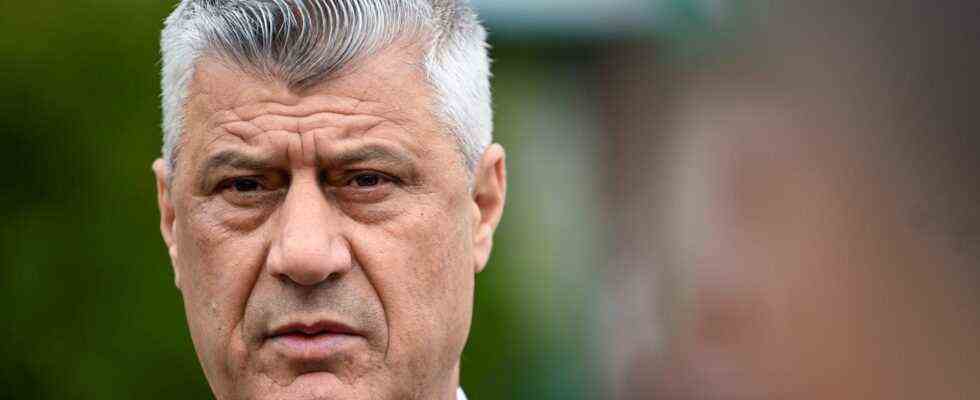Status: 15.09.2021 6:03 a.m.
Almost 22 years after the war in Kosovo, the first trial before the Kosovo Special Tribunal begins in The Hague. In the dock: senior KLA officials and former President Thaci.
Life in the Kosovar capital Pristina goes on as usual. Students meet in parks, the market is well attended. But under the surface it is seething. The upcoming first meeting of the Kosovo Tribunal in The Hague is dividing society.
There are those who consider the court to be one-sided because it only deals with perpetrators from Kosovo – and not with those on the other side, with the Serbs. And there are the families of the more than 13,500 victims of this war who, 22 years after the end of the conflict, are finally hoping for justice and for answers to the whereabouts of their relatives. More than 2000 people are still missing.
Allegation: atrocities, torture and murder
In The Hague at the Special Tribunal for Kosovo, the people responsible for this now want to be held accountable. The special court was created in 2015 under Western pressure. Although it is an institution under Kosovar law, like many international courts of law, it has its seat in The Hague, the Netherlands. Neither the judges nor the prosecutors are from Kosovo. Your task: You should deal with the events between January 1998 and December 2000.
In that first trial in the dock: Salih Mustafa, the head of a notorious prison camp in Kosovo. The chief prosecutor accuses him of arbitrary atrocities, torture and murder. 16 witnesses are to testify against him.
Political heavyweights in the dock
The court has now brought charges against eight men in various proceedings. These key figures of the former KLA liberation army have been in custody in the Netherlands for about a year. They are all political heavyweights in Kosovo.
Best-known inmate: Hashim Thaci, President of Kosovo until shortly before his arrest in November 2020. Although he was only 31 years old at the time, the man known by the battle name “The Snake” was an important decision-maker: As commander-in-chief of the KLA, he is alleged to have committed, initiated and covered up crimes against humanity during and after the war. Also: Kadri Veseli, the former head of the former intelligence service, Jakup Krasniqi, the former President of Parliament and Rexhep Selimi, a former MP.
The prosecutor accuses them of all of murder, torture, crimes against Serbian civilians and Roma – and a so-called collective criminal enterprise to eliminate political opponents.
Still identification with UCK
The identification and solidarity with the KLA as a symbol for the liberation struggle against Serbia is still great in the country. The red and yellow logo of the UCK is definitely present in the cityscape – on flags in windows, stickers on street lamps, T-shirts on the market. Many Kosovars feel that the special tribunal is unjust. In the heroic stories, the war criminals can only be found on the side of the Serbian government.
However, the atrocities committed by the Serbian regime have already been dealt with by the special tribunal for the former Yugoslavia. Explicitly in the proceedings against the former Serbian President Slobodan Milosevic.
But now it is all about the Kosovar-Albanian guerrilla army UCK, which relied on armed violence in the fight against the Serbian regime. Even after the end of the war, to support the PDK party that emerged from the UCK at that time. Up to 200 murders of political opponents are said to have taken place in the post-war period alone in order to give the PDK access to political power in the country. At that time, Kosovo was already under UN administration.
More than 10,000 civilians among the victims
So far, the corrupt Kosovar justice system and inadequate witness protection have ensured that most cases have remained unsolved. The Center for Humanitarian Law in Kosovo complains that there have only been 65 convictions.
An unsatisfactorily low number considering the high number of victims. The Center for Humanitarian Law has documented all cases. More than 10,000 uninvolved civilians are among the victims: 1,200 Serbs, 8,600 Albanians and members of many minorities such as the Roma.
Witnesses are still being threatened
An elaborate witness protection program was installed to make it easier for victims to testify. Another reason why the tribunal is in The Hague. For Bekim Blakaj, director of the Center for Humanitarian Law, the only way to protect witnesses and protect the trials from political interference. In Kosovo, witnesses and their families were and are still being threatened, blackmailed or physically assaulted.
Last September, data from witnesses was leaked to the successor organization of the KLA. With the result that many no longer want to testify in The Hague. A complication for the court.
After all: The archives of the dissolved UN war crimes tribunal for the former Yugoslavia also contain thousands of pages and hours of sound recordings with statements and documents that can be used as sources. For the victims, the greatest interest is that the court provides evidence of who is responsible for the crimes against Serbs and Kosovar Albanians and what atrocities the irregulars committed in Thaci’s name.
Did the KLA finance itself through organ trafficking?
There is a particular interest in the question of whether the public prosecutor’s office can present evidence for the accusation of organ trafficking. An investigation report provided indications of a possible international trade in vital organs of Serb prisoners for transplants in order to finance the KLA system. The alleged victims have all disappeared without a trace. The presumably darkest chapter of the KLA, which is now being processed in The Hague.

